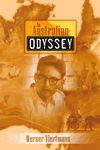Werner Viertmann is one of those people who will only settle down when old age and arthritis tells them to. He was born in Selm, West Germany on the 29th of January 1929 in the middle of one of the coldest winters on record. His first move happened at the age of six when his father was transferred to the town of Müenster in Westfalia, a few kilometres north of where he was born.
Before emigrating in 1954 he was involved in agricultural research.
In Australia he bought himself a second-hand motorcycle and for two years worked his way around the continent. Early in 1957 he returned to Germany. Prodded by his father he recorded his adventures.
He went back to Australia in 1958. A year later he joined the Soil Conservation Authority of Victoria. When, in 1981, he was offered a job with the Food and Agricultural Organisation (FAO) of the United Nations, he was in charge of what became known as the Eppalock Project. The job offered was in Tunisia and involved preparing a Soil and Water Conservation curriculum and teaching in French.
After about two and a half years in Tunisia, he returned to Australia and his job with the SCA in Heathcote, Victoria. There he bought some land and when not running the Project, cleared it and planted it to vines. Stuart Anderson, the well-known Australian winemaker, made his first wine which established the township as the centre of a quality growing area.
In 1973, another job offer from FAO took him to Jordan. After Jordan he was sent to Morocco, Kenya and again to Tunisia from where he retired in 1985. Then came ten years of intermittent consultancy work and the restoration of a ruined oil mill in the South of France.
When the old manuscript about his earlier travels around Australia turned up, he decided to re-tell the story in the language he had experienced it in. Since his French had now become tolerable, the South of France seemed the logical place to come to rest and await the Inevitable.

Sidharta Books & Print
Book Publishers

